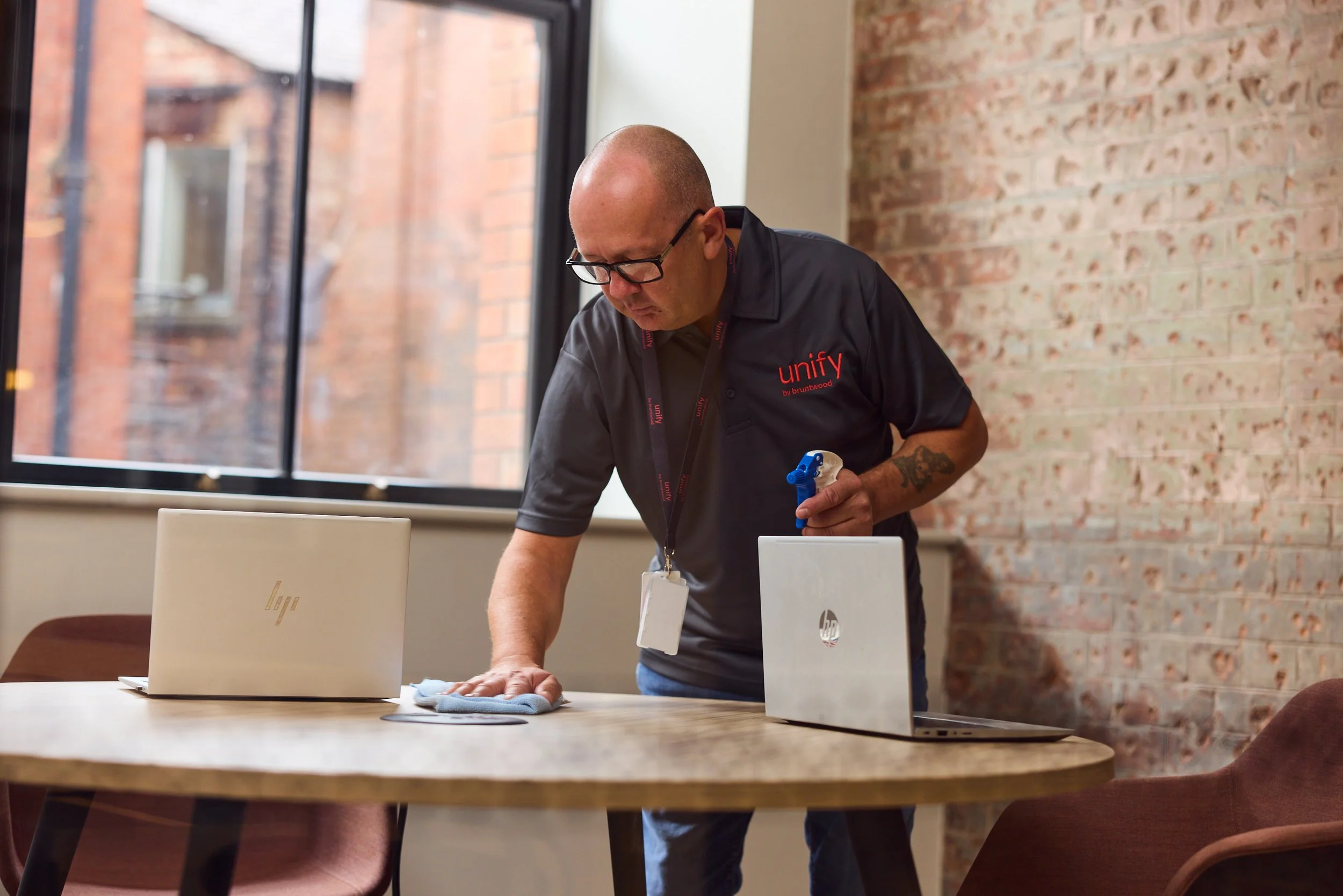What you should look for in a Living Wage cleaning tender?
A Living Wage cleaning tender should demonstrate clear supplier commitments to fair pay, workforce stability, measurable social value, and sustainability.
Choosing an ethical cleaning partner
For many organisations today, tendering for cleaning services is about more than just cost efficiency. There's an increasing focus on long-term value, ethical practice, and alignment with organisational priorities, from social impact to sustainability.
As more cleaning tenders include criteria around Real Living Wage commitments, procurement professionals are rightly asking: what does good actually look like? This article outlines what to expect from a Living Wage-focused cleaning tender and why it's worth demanding more from your suppliers.
Why the Real Living Wage matters
The Real Living Wage (RLW), set by the Living Wage Foundation, reflects what people actually need to live on. Unlike the statutory minimums, it's voluntarily paid by employers who want to go beyond compliance and who understand the connection between fair pay and service quality.
For ethical cleaning companies in the UK, adopting the RLW signals a genuine commitment to fairness and service standards. It leads to lower staff turnover and more trusted, engaged teams. For customers, this translates to greater service consistency, fewer missed shifts, and stronger working relationships. In a sector where staff turnover is often high, this creates real operational resilience.
For frontline cleaning teams, fair pay offers financial security, higher morale, and better job satisfaction. These individual benefits drive organisational gains. According to the Living Wage Foundation, 94% of accredited employers say they've seen a business benefit, and 62% report improved recruitment and retention.
1. A clear commitment to fair pay
Start by checking whether the cleaning company is an accredited Living Wage Employer. This shows they've gone through independent verification rather than just making promises.
Then look deeper into the scope of that commitment. Are all directly employed cleaning staff paid at least the RLW? Does that include TUPE transfers and part-time teams? Is pay updated annually in line with RLW increases, and do subcontractors also meet the standard? You should also see how wage allocations are clearly costed within pricing models.
The best providers are transparent in their Pre-Qualification Questionnaire (PQQ) and social value sections, showing exactly how fair pay is built into their pricing structure.
At Unify, we're proud to be an accredited Real Living Wage employer and founding member of the Greater Manchester Good Employment Charter. We apply annual pay increases in January, ahead of the national RLW increase in April, because we believe in creating workplaces where everyone can thrive.
"Unify puts a real emphasis on its people. Taking a values-based approach and paying the Living Wage means they've got a really engaged workforce who feel like they're an extension of our own team."
— Lissa Earnshaw, Site Operations Manager, MSP
2. A culture that supports retention and motivation
Fair pay is just the foundation. It's the culture that keeps people engaged. A supplier that genuinely supports its people will deliver more consistent, reliable results.
High staff turnover increases disruption. A stable, supported workforce means site familiarity, fewer missed shifts, and better service continuity. Ethical cleaning companies should be able to evidence this through low staff turnover and long average tenure, high employee satisfaction or engagement scores, and robust TUPE support processes. Their recruitment should be aligned to values and service consistency, with structured onboarding and shadowing. You want to see ongoing training, inclusion initiatives, wellbeing practices, and strong benefits packages that go beyond base pay.
Our teams aren't only fairly paid, they're trained, supported, and genuinely valued. We invest in people so they can deliver outstanding results every day, and it works. We've built a long-serving, engaged team, supported by a full benefits package that includes a pension scheme, sick pay, birthday leave, and recognition schemes. Our in-house talent team handles values-led recruitment and onboarding. With a +86 eNPS score – far above the industry average – and an 86% engagement rate, our people aren't just retained, they thrive.
3. Workforce training and development
Look for cleaning companies that go beyond the basics. Professional development reflects a long-term investment in service quality.
Strong responses should show evidence of site-specific onboarding and induction, ongoing training tailored to different environments, and clear career progression frameworks. In specialist settings like schools, labs, or healthcare facilities, safeguarding and inclusivity training become especially important.
Our teams are fully trained for each site's environment. We promote from within wherever possible and many of our colleagues have progressed to senior roles.
4. Social value and community impact
Living Wage accreditation often reflects a broader commitment to social impact. Under the Social Value Act 2012, public sector buyers are required to consider the social, economic, and environmental benefits when procuring public services.
When reviewing a cleaning tender, look for evidence of local and inclusive recruitment practices, supported employment or work opportunities for disadvantaged groups, and community volunteering or partnership initiatives. Apprenticeships and employability programmes matter, as do clear metrics for tracking social value. You should see a published social value strategy or report, participation in initiatives like the Good Employment Charter, and transparent reporting on gender pay and workforce diversity.
Alongside paying the RLW, we recruit locally, collaborate with disability charities, support apprenticeships, and give back through volunteering. As part of the Bruntwood group, we're a Disability Confident Employer and contribute to social impact goals across inclusion, sustainability, wellbeing, and cultural vibrancy.
5. Alignment with ESG and sustainability goals
Environmental impact is increasingly part of ethical supplier assessment, especially in commercial and public sector cleaning tenders. Look for providers that align with your ESG goals and can help strengthen your sustainability reporting.
This might include chemical-free or low-impact cleaning systems, water-saving and energy-efficient methods, and waste reduction and recycling protocols. Clear carbon reporting or carbon-neutral targets demonstrate serious commitment.
We use chemical-free systems (Tersano and Vireo3) that convert water into a sanitising agent, which reduces environmental impact and plastic usage whilst maintaining hygiene standards. We send zero waste to landfill unless legally required to do so, and our head office is powered entirely by renewable energy thanks to Bruntwood's investment into Kirk Hill Windfarm. We also support City of Trees, restoring woodland and green spaces in Greater Manchester.
6. Cultural and operational fit
A good cleaning partner should feel like an extension of your team, not just a service provider. Look for a provider who tailors their services around your needs rather than the other way around. Whether it's adapting schedules, scaling delivery or handling urgent requests, flexibility and trust make a real difference.
Ethical companies don't just say the right things, they back them up with measurable, accountable service. You want to see a tailored mobilisation process and TUPE integration, joint review meetings and open feedback loops, and transparency in reporting with data on attendance, performance, and training. Local, engaged cleaning team members who deliver values-led service through quality assurance and compliance frameworks are what distinguish the best providers.
At Unify, we deliver service shaped by your needs. Our approach is flexible, values-led, and proven across commercial, public, and education sectors.
7. Flexibility and operational resilience
Operational resilience is key. Assess how well a provider can adapt to your building's changing needs. Flexibility around cleaning schedules is often just as important as technical capability, and good cleaning partners will build services around your environment rather than forcing you to fit their standard model.
A strong partner should be able to adapt to term time, hybrid work patterns, and event schedules. They should scale up or down as needed, provide mobile or floating teams for absence cover, and offer tailored services for different space types whether that's labs, communal areas, or something else entirely.
We design responsive cleaning services that scale and flex as your environment evolves, always with minimal disruption.
8. Accreditations and third-party endorsements
Independent accreditations help confirm a cleaning supplier's compliance, quality, and governance. Look for Living Wage Foundation accreditation, ISO 45001 (Health & Safety), Safe Contractor Accreditation, and Good Employment Charter recognition.
Unify holds all of the above accreditations, providing assurance of our professionalism, ethics, and accountability.
Choosing a partner with purpose
For procurement teams, selecting an ethical cleaning provider is a strategic decision. It helps fulfil broader organisational goals, from social value to ESG compliance and workplace standards.
The Real Living Wage is a clear benchmark for supplier ethics. But more than that, it reflects how a provider thinks about people, quality and long-term value. When combined with transparency, flexibility, and community investment, it's a strong foundation for a lasting, productive partnership.
At Unify, we deliver with care, integrity, and purpose. We believe that ethical practices lead to better outcomes for our customers and our people. Our teams are trusted, trained, and proud of the role they play in creating clean, healthy spaces where people and businesses can thrive.
If you're reviewing or preparing a tender and want a partner who brings reliability, flexibility, and real social value to the table, we'd love to hear from you.
Related content





